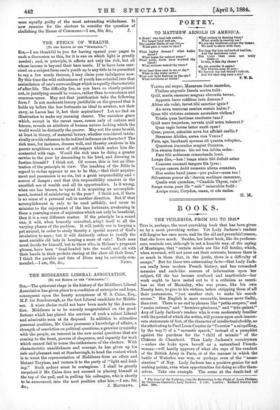THE ETHICS OF WEALTH.
[To THE EDITOR OE THE " SPECT/20141
SIR,—I am thankful to you for having opened your pages to such a discussion as this, for it is one on which light is greatly needed ; and, in principle, it affects not only the rich, but all whose income is beyond their bare needs. If to have been exer- cised on a subject from one's youth up is any title to be permitted to say a few words thereon, I may claim your indulgence now. By this time the wild enthusiasm of youth has subsided into that assimilation of one's surroundings which is equally characteristic of after-life. The difficulty lies, as you have so clearly pointed out, in justifying oneself to reason, rather than to conscience and common-sense. May not that justification take the following form P Is not moderate luxury justifiable on the ground that it holds up before the less fortunate an ideal to awaken, not their envy, as Lacon has it, but their aspirations P Let me find an illustration to make my meaning clearer. The nameless grace which, except in the rarest cases, comes only of culture and leisure, reveals an attribute of human nature lacking which the world would be distinctly the poorer. May not the same be said, at least in theory, of material luxury, whether considered intrin- sically or with reference to its indirect influence on character? The rich man, for instance, dresses well, and thereby awakens in his poorer neighbour a sense of self-respect which makes him dis- contented with rags. Would the rich man be doing a greater service to the poor by descending to his level, and dressing in fustian himself ? I think not. Of course, this is but an illus- tration of the principle in view. The teaching of the Bible in regard to riches appears to me to be this,—that their acquire- ment and possession is no sin, but a great responsibility and source of danger ; and that this responsibility consists in the unselfish use of wealth and all its opportunities. Is it wrong, when one has leisure, to -spend it in acquiring an accomplish- ment, instead of ministering to the poor? I think not, if there is no sense of a personal call in another direction. But if that accomplishment is only to be used selfishly, and never to minister to the enjoyment of the less fortunate, awakening in them a yearning sense of aspiration which can only be beneficial, then it is a very different matter. If the principle be a sound one, it will, when honestly consulted, adapt itself to all the varying phases of the problem. It will justify one in keeping a pet animal, in order to study thereby a special aspect of God's revelation to man ; but it will distinctly refuse to justify the most amiable old lady in keeping a score of cats ! Each man must decide for himself, but to those who, in Holmes's pregnant phrase, have been "dead-headed into the world, and sit with their hands in their pockets staring at the show all their lives," I think the parable and fate of Dives may be seriously com- mended.—I am, Sir, &c.,NE310.














































 Previous page
Previous page